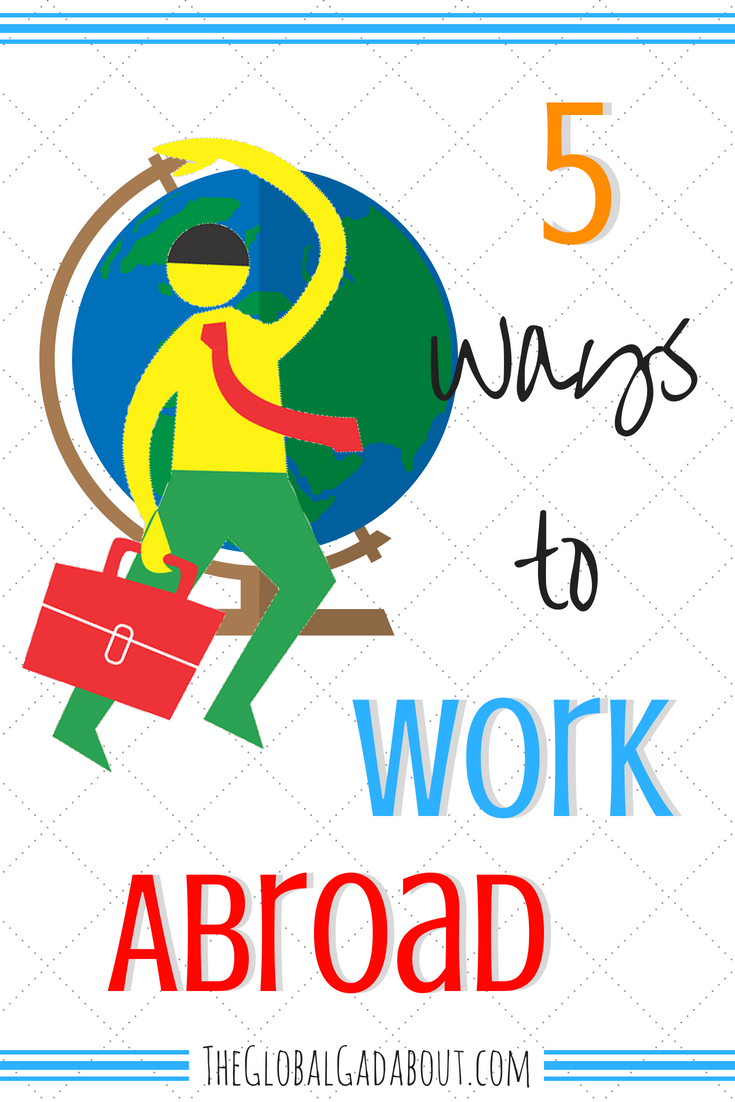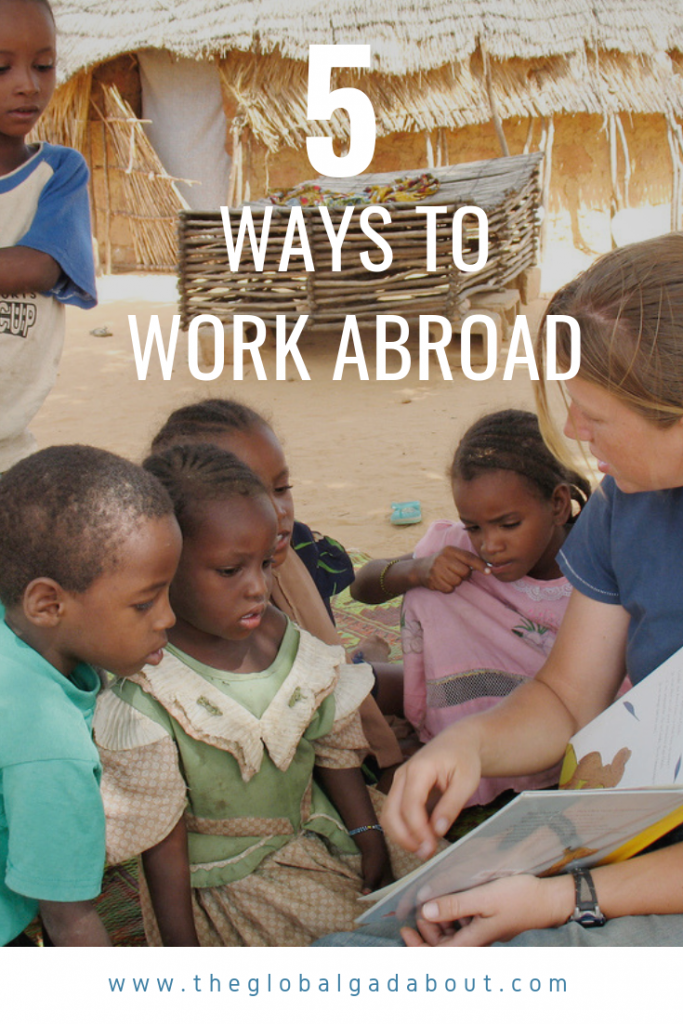By most people’s standards, I have traveled a lot. I have visited almost 70 countries on all seven continents. For quite a few of those 65+ countries, I was passing through as a tourist, spending a few days, a few weeks, sometimes only a few hours, seeing the sights, tasting the food, and buying the local goods. But I have also spent long periods of time studying or working in one particular foreign country. With a US passport, I have held down normal, everyday jobs in South Korea and New Zealand and worked nontraditional exchange “jobs” in New Zealand, Canada, Scotland, and England. Working abroad gives you a better perspective on life in another country. You become more a part of the community and meet locals more easily. Not to mention, you can earn some money to cover your travel expenses (sometimes quite a bit more than that!), so that you can, as my tagline professes, explore the world further, longer, and cheaper.

So how do you go about getting a job in a foreign country? If you want to hold a normal job, in your career field, for a longer period of time, you probably have to go the traditional route and obtain a work visa. This can sometimes be tricky. In most cases, you must first find an employer and they must then sponsor you for your work visa. In some places, such as a lot of Europe, preference is given to citizens (or EU members) who do not need visas, so it can be difficult to find a job abroad if you are looking to live and follow a career. Certain fields (nursing, for example), are very much in demand all over the world, and thus make it easier for foreigners to join that workforce. If you are more like me, however, and looking for employment not to further a particular career path but as a way to experience life in another country and/or supplement your travel fund on the road, there are a lot of great choices for working abroad.

*Note: As I am an American citizen, my perspective is somewhat skewed toward what kind of work is available for Americans. Most of these suggested work abroad options are available for other nationalities, though visa requirements may vary. Please check what your government requires.
*This post includes one or more affiliate links. I earn a small commission (at no extra cost to you!) if you purchase a product or service through one of these links. Find out more here.*
1. Teach English as a Foreign Language
The summer after I graduated from university with a bachelor’s degree in anthropology, I lived in Prague, Czech Republic taking a course to become a certified English a Foreign Language instructor. The English language is so ubiquitous in business, tourism, and pop culture worldwide, that citizens of countries all over the world are clamoring for native speakers to teach them to speak it. And being a native speaker is pretty much the only requirement needed to teach English abroad.

Yes, it will help you get (and keep) a job if you have a TEFL certification and are an engaging instructor, but those are not actually requirements in a lot of places. I came home from my course in Prague freshly certified to teach English, promptly applied for several postings I found online and was very soon hired to teach English at a private academy in South Korea. I lived on Jeju, a small volcanic island 100 miles off the coast of South Korea, for a year, teaching English to ages 4 to 15.

Depending on where you teach, the salary and benefits can vary quite a bit. Some places pay just enough to cover your expenses, but others allow you to rack up a bit of savings. South Korea is one of the best paying places for English teachers and has some great bonuses. I received a highly liveable salary, plus my employer found a small studio apartment for me across the street from the academy, paid my rent, health insurance, and my flight to Korea and home again at the end of a year contract. I took several long weekend trips within Korea during that year, plus one to Japan (another well-paying place to teach English), and the exchange rate between won and US dollars tanked right before I left, but I still took home US$13,000 in savings. Not bad for one year of work!

I’m an introvert and wouldn’t ever call myself a “kid person”, so some aspects of the job were pretty difficult for me. I love languages and looking back feel I might have liked the work itself better if I had looked for a job teaching small classes of teens or adults, but the experience as a whole was very valuable. I made great friends with several of the Korean teachers, really got to know what it was like to live in such a different culture on the literal other side of the world from my home, learned to drive a scooter (which has been my primary vehicle back in the US ever since) and I turned around and used half my savings from this job to complete my life goal (at age 25), of visiting my 7th and final continent, Antarctica. Check out my post on the dos and don’ts of teaching English abroad for more information.

If you’re looking to get certified to teach English, many universities have courses and there are many specialized schools. If you’re a traveler like me, try looking for a course abroad. I enjoyed the one I took in the Czech Republic called TEFL Worldwide Prague and found it very useful. You can even get certified online through programs like i-to-i.
A lot of certification schools will help you find a job when you complete their course. If you want to look for a job without training or just supplement what your training course can offer you, Dave’s ESL Cafe is one of the original TEFL job boards and highly recommended. I personally found my job through ESL Employment.
2. Working Holiday Visas
After being home from South Korea for a few months, I got antsy for another work abroad experience. I wanted to try something new, so did a little research and ended up applying for a Working Holiday Visa in New Zealand.

A Working Holiday Visa is a visa granted to young adults allowing them to work in another country for a certain period of time. Generally, they are valid for one year and allow you to work any job you can get, for up to 6 months per employer. The standard eligible age range is 18 to 30 years old, inclusive. Australia is the only country I’ve seen that allows you to apply to extend your Working Holiday Visa for an additional year.
Because of the usual shorter-term nature of the visa regulations, a lot of Working Holiday participants end up working lower-paying jobs in bars, restaurants, hostels, and the tourism industry. Picking fruit or other manual labor is also a big one, or administrative roles answering phones and the like. That may be the norm, but the visa does allow you to work any job you can get. I worked as a manager in a couple of small hostels and cleaned rooms at a motel. Nothing glamorous, but it paid my expenses, gave me a free place to sleep, and allowed me to stay and explore the stunning country of New Zealand longer.

You can apply online for a Working Holiday Visa. I was granted mine within a couple of days, though it may take longer depending on circumstances. You may have a year to activate your visa before it expires. My post, Working Holiday Visas: A Beginner’s Guide, goes into more depth on specific requirements and the application process, plus details on all the countries that offer this option to American citizens and links to applications.
3. Foreign Service/Peace Corps
The Foreign Service and Peace Corps are work abroad options that I have not personally taken advantage of, but I know people who have and have enjoyed them. There are only two very specific, personal reasons I did not try to work abroad through one of these government programs. I felt I was not supportive enough of many US government policies to represent and promote them in other countries as a Foreign Service Officer, and I get so restless when I’m in one place for too long (even a foreign country) that the 27 month commitment the Peace Corps requires was more than I could handle. If not for these two reasons, I would absolutely have pursued one or both of these governmental opportunities.

In the foreign service, you may be posted to an embassy or consulate in any number of countries. There are 5 different career tracks you can take, depending on your skills and interests. In order to be considered, you must pass an exam, which is given 3 times a year. Learn more about the Foreign Service here. The US government also offers foreign employment in a variety of other fields. Check out USAJobs.gov to search the opportunities.
The Peace Corp has options to put your skills to work where they can best be of use, including teaching English, small business or youth education, helping to supply medical care, clean water, or build infrastructure. You receive housing and a monthly stipend enabling you to live at the local standard, plus over $9000 upon completion of your commitment. Be aware, that commitment is 27 months. If you can commit to the time, it can be a very rewarding and productive way to experience living and working abroad.

4. Seasonal & Guide Jobs
The tourism industry especially is rife with temporary and seasonal jobs all over the world. You could work at a ski resort, on a cruise ship or yacht, at a ranch or summer camp. You could drive a shuttle van, teach surfing, lead dolphin tours. You could help maintain national parks, work at an outdoor adventure course, take care of animals, pick fruit, or serve at a restaurant or bar. There are so many categories of seasonal and guide jobs, I can’t possibly list them all. I’ve worked plenty of these types of jobs, from shuttle driver to zip line tour guide to dishwasher, sometimes in the US, and sometimes abroad.

The temporary nature of these gigs means that many employers will take who they can get to a certain extent and welcome foreign workers to fill that need. Sometimes it can be easier to get these types of jobs if you go to the place you want to be and ask around about work, but there are many a website where a lot of these positions are posted if you want to secure a gig before traveling. CoolWorks is a comprehensive site offering unique seasonal and temporary jobs in many different categories both in the US and abroad. Or check out Cruise Job Finder for cruise ship and yacht openings, resort and guiding jobs.
5. Remote Work, Self-Employment, & Freelancing

In the technology age, holding a steady job no longer tethers you to one spot. A lot of companies have work from home positions that can be done from anywhere with an internet connection. Why not from a foreign country? If you need to interact with the public by telephone or video chat, you might have to work unusual hours, depending on the time difference, but it can be done. Some remote work opportunities that are open to those not looking to follow a specific career path include travel agent, transcriber, English tutor (online or in person), virtual personal assistant, data entry, and so many more.
If you are self-employed, you make the rules, so why not start a business that allows you to work at any time from anywhere? Be an artist, writer, investor. Teach or tutor what you know. Set up an online class through your own website or ones like Skillshare or Udemy. Or, if you’re going to be there for a while, put up notices in the country you are traveling to and teach or tutor in person. There are lots of companies looking for native English speakers to tutor or chat with students of English as a second language online. As a former ESL teacher, this something I’ve looked into as an option.

What I’ve settled on personally, for the most part, is freelance work. I’m a writer, obviously, with this blog, The Global Gadabout, to keep me busy. But I’ve also written freelance travel articles, website copy, marketing brochures, area guides, how-to guidebooks, and a couple of novels. I’ve also worked as a freelance voice-over artist, recording radio commercials, eLearning series, and audiobooks. Plus, I have an Etsy store to sell my handmade jewelry. None of these things make me a living, but together, they let me travel and do what I love. If you have a skill, use it! Check out Upwork or Fiverr as a source for freelance gigs.
When you work remote and freelance in another country, you are entering as a tourist. This means you have to keep in mind the time limits of a tourist visa. My post on Countries with the Longest Tourist Visas will give you a comprehensive list of countries you can stay in long-term (up to a year or more!) on just a tourist visa. If you want to stay longer than a couple of months in a place that’s not on that list, you may need some other type of visa. Check out my post on The Schengen Agreement for tips on understanding Europe’s largest visa zone.

There are plenty of non-traditional ways to work abroad and supplement your travels if you look hard enough for them. I’ve found the experience of working in another country really gives you a different and deeper perspective on life there and how it relates to life back home. I’m always on the lookout for ways to feed my travel addiction. Working abroad is an amazing way to explore the world further and longer!
Pin this post for later!




